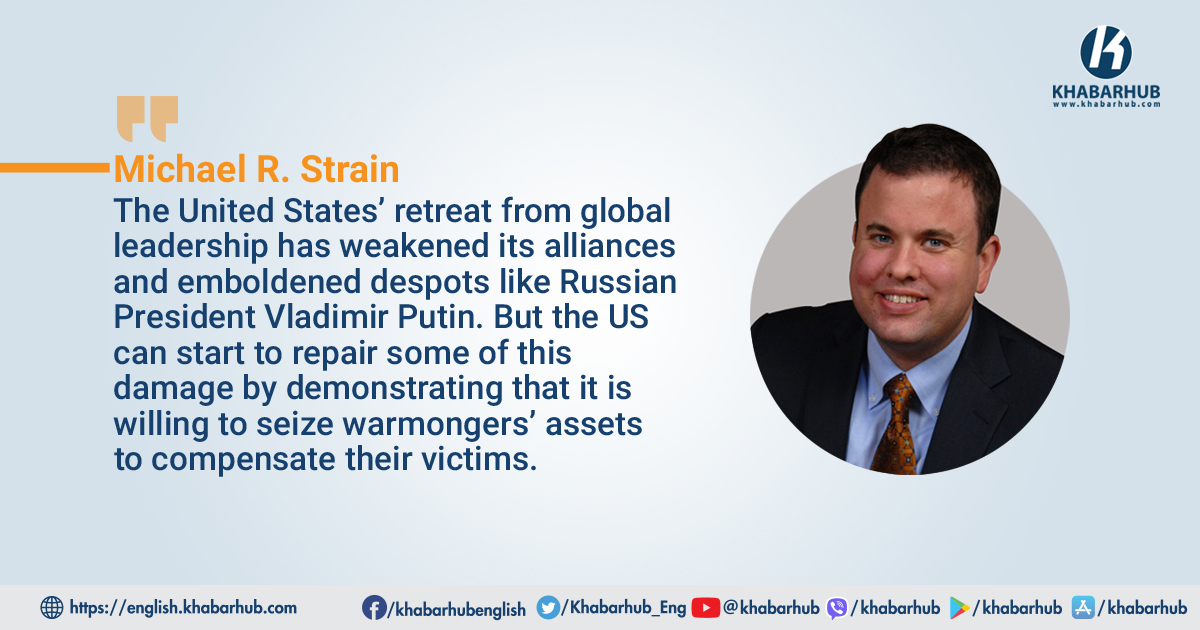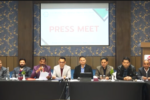Following Russia’s brutal assault on Ukraine 24 months ago, Western governments – including the United States – froze around $300 billion of Russian central-bank assets, or roughly half of the country’s total foreign currency and gold reserves at the time.
The aim was to prevent the Kremlin from using those funds as part of its war chest or to blunt the impact of US and European economic sanctions.
The freeze on Russian assets was an aggressive component of the Western response.
But some officials and commentators want to go further, by seizing the assets and using them for Ukraine’s reconstruction.
This month, Nikki Haley, who is challenging Donald Trump in the Republican primary contest, announced her support for such a move.
Russian President Vladimir Putin “is a war criminal and thug who invaded a free country,” she told Bloomberg News. He therefore must “pay the price for his actions.”
To that end, Haley is supporting the Rebuilding Economic Prosperity and Opportunity (REPO) for Ukrainians Act, an unprecedented piece of legislation approved by the Senate Foreign Relations Committee last month by a 20-to-one vote.
If REPO becomes law, it would be the first time the US has seized the central-bank assets of a country with which it is not at war.
If they are seized, other countries might be reluctant to hold dollars or euros in the future; the hegemony of the dollar might be threatened; international trade and finance could be disrupted; and the door could be opened for other bad actors to pursue asset seizures of their own.
The common-sense case for seizing Russian assets is straightforward. Russia launched an unprovoked, brutal invasion of a neighboring country, murdering civilians and inflicting enormous damage.
In 2019, before the war and the pandemic, Ukraine’s GDP was around $154 billion.
Now, the World Bank estimates that reconstruction and recovery will cost $411 billion over the next ten years.
Obviously, Russia should be first in line to foot the bill – ahead of Ukraine, the US, and European countries.
Top of Form
But there are good reasons to be cautious. Some critics of the seizure are concerned that Russia’s assets may be protected under the doctrine of sovereign immunity.
Our focus must always be about preventing war and keeping our troops out of harm’s way. … We need a president who has the moral clarity to do that.”
If they are seized, other countries might be reluctant to hold dollars or euros in the future; the hegemony of the dollar might be threatened; international trade and finance could be disrupted; and the door could be opened for other bad actors to pursue asset seizures of their own.
These concerns are legitimate, but ultimately unpersuasive. The case that asset seizure is permissible under international law as a countermeasure to Russia’s aggression and destruction is compelling. There is even precedent.
In 1992, the US and EU member states used Iraqi state assets to compensate Saddam Hussein’s victims from Kuwait and other states without his regime’s consent.
Moreover, there is no alternative to the dollar as the global reserve currency, and Western financial institutions remain the safest in the world for investors.
Considering that Russia’s central-bank assets have been frozen for two years with no noticeable effect on reserves and no disruption in international flows, an asset seizure would likely be a relative non-event.
Deterring other bad actors from aggression requires that Ukraine’s needs be put before Russia’s.
Far from encouraging future acts of aggression, a harsher punishment for Russia would compel other bad actors to think twice before going down the same path.
By endorsing the asset-seizure legislation, Haley is standing with Ukraine at a time when many Republican senators and House members are abandoning it.
The juxtaposition between her and isolationist Republicans shows why the GOP, the country, and the world would be better off with her as president.
She stands in stark contrast to Donald Trump, whose commitment to the post-World War II liberal international order was already in doubt before he said he would “encourage” Russia to attack US allies who don’t meet their financial obligations to NATO.
The fact that the asset seizure would be unprecedented is another reason why it should be done. Sustaining support for Ukraine in its hour of need would fortify the resolve of Ukrainian soldiers and lift the hearts of Ukrainian citizens.
As Haley put it in her statement to Bloomberg: “Just in the past few days, Trump sided with Putin over NATO, and his willingness to abandon Ukraine and our allies puts every American in danger.
Our focus must always be about preventing war and keeping our troops out of harm’s way. … We need a president who has the moral clarity to do that.”
Rather than prolonging the debate about seizing Russia’s assets, America and its allies should be focusing on the complex questions that would come next: how to transfer the funds, and how to ensure that they are put to the best possible use in Ukraine’s reconstruction and recovery.
America’s retreat from global leadership has weakened its alliances and emboldened despots, thugs, and authoritarians around the globe.
But this mistake is still reversible. The liberal international order has been a bedrock of prosperity since the end of World War II.
It has constrained oppressive regimes and aggressor states, and furnished the peace and stability required for commerce to flourish.
Seizing Russia’s assets would breathe new life into the increasingly frail postwar order.
The fact that the asset seizure would be unprecedented is another reason why it should be done. Sustaining support for Ukraine in its hour of need would fortify the resolve of Ukrainian soldiers and lift the hearts of Ukrainian citizens.
Is seizure risky? Of course. But it is a risk worth taking.
(Michael R. Strain is the Director of Economic Policy Studies at the American Enterprise Institute)
Copyright: Project Syndicate









Comment